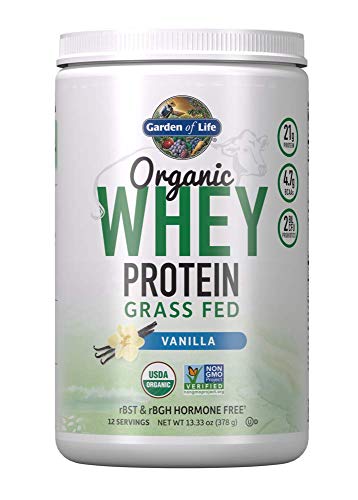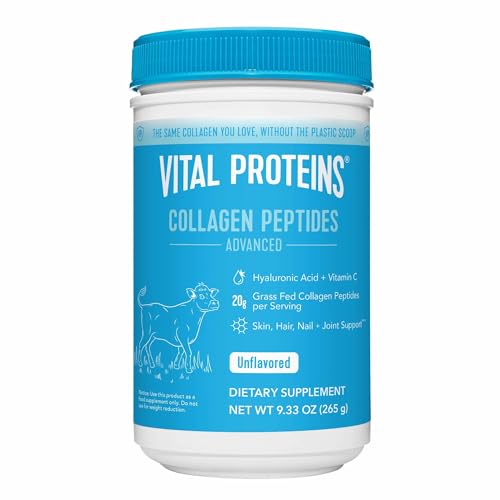This post contains affiliate links. Please see our disclosure policy.
What are the best protein powders for women looking to lose weight? In my opinion, the ones with the best ingredient profiles, the least amount of additives and the best taste. Whether you are trying to build muscle, or just eat a more balanced diet, protein powder can be part of the equation.
Of course, you can get your protein from a variety of sources like animal products and/or plant foods—but protein powder is also a source of protein that works well for women looking to lose weight because it’s a great way to meet your daily intake of protein grams for fewer calories.
But let’s be clear: protein doesn’t make you lose weight; a calorie deficit does.
However, if you use protein shakes to meet your protein intake while eating a calorie deficit, it can be a convenient and helpful part of your weight loss plan. I personally eat a protein smoothie every day for breakfast and I’ve tried a variety of brands.
Below are the weight loss protein powders I tested and rated them based on taste, ingredients, and price. Below are my favorite whey, collagen, egg, and plant-based brands.

Save This Article To Read Later
Table of Contents
What is Protein?
Protein is an essential macronutrient found throughout the human body. Made up of amino acids, protein helps boost energy levels and improve our muscle mass, bones, cartilage, skin, hair, and blood.
And since it can’t be stored in the body like fat and carbohydrates, we need to replenish the supply every day.
How Much Protein Do You Need Daily?
Most of us need about 0.5 grams to 1.0 grams of protein per pound of body weight per day. For example, if you weigh 140 pounds, you’ll likely want to be in the range of 70 to 140 grams of protein per day.
For athletes and those trying to gain muscle, 1 gram per pound of body weight may be the goal. And while you can obtain enough protein per day from your regular diet, many choose dietary supplements such as protein powder as a convenient way to meet their needs.
Do You Need to Use Protein Powder?
Protein powder supplements are part of the daily routine for many people. I carry protein powder in my gym bag and keep it in my kitchen cabinet.
I tend to have protein powder in my morning smoothie for my breakfast.
I am an early morning workout person and the protein powder serves a dual purpose: post-recovery to my muscles and being a part of my yummy, satisfying morning smoothie. Some people prefer scrambled eggs, sausage, or cottage cheese.
There is no one right source of protein! It’s all about your lifestyle and your palette. For me, it’s a great way to meet my daily protein intake.
It’s also worth mentioning that if you use protein powder for post-workout recovery, the recommendation is to take it within 45 minutes to 2 hours after your workout for best results, no matter which option you choose.
How I Picked the Best Weight Loss Protein Powders for Women
So, with all the different types of protein powder out there, how do you know which are the best ones? I’m breaking it down by type of protein and why I like it based on ingredient quality (natural ingredients are important!), taste, and price. I avoid weird ingredients like natural flavors, sucralose, strange oils, and gums.
I’ve taste tested a variety of brands and these are my picks for the best weight loss protein powders for women.
Remember, protein powder is not a weight loss supplement, but a good option for protein with less calories and fat than, for example, a steak.
Here are the criteria I have used to rate the best weight loss protein powders for women:
- Price
- Taste
- Manufacturing quality (including ingredients)
- Overall satisfaction (I’m a tough customer)
I have personally tried all of the below protein powders I am going to suggest! Each product has held up to my standards regarding price, quality, taste, and satisfaction.
GHU is a participant in the Amazon Services LLC Associates Program. This post may include affiliate links which means I may earn a small commission if you shop using the links below at no additional cost to you.
Best Whey Protein Powders
Whey protein powder is a fast-absorbing source of protein derived from milk to support lean muscle. It is a complete protein containing all of the essential amino acids and is very low in cholesterol and fat relative to other protein sources.
Whey protein has the reputation as being the best post-workout choice and, in fact, studies have shown that your body absorbs and uses whey protein more effectively than other protein sources due to a higher concentration of BCAAs (branched-chain amino acids): leucine, isoleucine and valine.
Whey protein powder is a fast-absorbing source of protein derived from milk to support lean muscle and help with muscle recovery and repair.
Leucine in particular is beneficial when it comes to muscle recovery and repair.
Another bonus? Whey protein curbs hunger and keeps your cravings at bay, which aids in your weight loss goals.
Whey protein powder is my #1 choice for supplementing since I usually ingest it for breakfast or after a tough workout.
Here are my picks for the best weight loss protein powders for women containing whey protein:
- $2.51 per serving
- 21 grams of protein per serving
- Includes probiotics and 4.7 grams of BCAAs
- USDA Organic, non-GMO, Kosher & American Humane Certified, and gluten-free
- $.089 per serving
- 21 grams of protein per serving
- 100% pure grass-fed whey protein, unflavored, non-GMO, soy-free, rBGH/rBST hormone-free, gluten-free, heavy metal-free
- $1.60 per serving
- 25 grams of protein per serving
- 100% pure grass-fed whey protein made without chemical detergents (acid or bleach), synthetic additives, or heavy metals
- Includes 5.9 grams of BCAAs per serving
- $1.97 per serving
- 25 grams of protein per serving
- Available in vanilla, chocolate, strawberry, and peanut butter
- Gluten-free, soy-free, and Keto-friendly
Best Casein Protein Powders
Casein protein powder is the other protein derived from milk but has a slower absorption in the body than whey. It’s often labeled the “bedtime” protein due to its slow absorption, providing hours of repair and maintenance.
Here are my picks for the best weight loss protein powders for women containing casein protein:
- $1.54 per serving
- 24 grams of protein per serving
- Available in chocolate peanut butter, chocolate supreme, cookies & cream, and creamy vanilla
- Slow-digesting and helps you feel fuller longer
- $1.67 per serving
- 26 grams of protein per serving
- Includes 5.9 grams of BCAAs per serving
- No additives such as rBGH and rBST
Best Collagen Protein Powders
Collagen makes up 30 percent of the body’s protein, making it the most abundant protein in the body. It’s responsible for connecting everything together and is found in the bones, muscles, tendons, skin, hair, and nails.
Collagen protein contains a high amount of glutamic acid, hydroxyproline, and proline.
These particular amino acids primarily benefit your hair, skin, and nails which is typically the more popular benefit collagen users are looking for.
Collagen protein helps maintain strong bones and joints while keeping your hair, skin, and nails healthy.
Collagen protein has a whole different amino acid profile than whey protein and you can take both daily depending on your personal goals and needs.
Here are my picks for the best protein powders for women containing collagen:
- My top collagen pick! I take this every day.
- $0.60 per serving
- 10 grams of collagen peptides per serving
- Paleo and Keto-friendly
- Unflavored with no gluten, refined sugar, dairy, whey, or soy ingredients
- $2.31 per serving
- 20 grams of collagen peptides per serving
- Certified Paleo Friendly & Whole30 Approved, no added sugars or sweeteners, flavorless and odorless, gluten and dairy-free
- $1.75 per serving
- 20 grams of collagen peptides per serving
- Grass-fed, non-GMO collagen, and free from added hormones, dairy, gluten, and artificial flavors
Best Egg Protein Powders
Egg protein is a high-quality, lactose-free protein source and in the world of protein, egg albumen is nearly perfect! Egg protein powders also mix well and can be used in baking.
Here are my picks for the best weight loss protein powders for women containing egg protein:
- $1.55 per serving
- 25 grams of protein per serving
- Includes 5.8 grams of BCAAs per serving
- Great option for a paleo diet
- $1.64 per serving
- 13 grams of protein per serving
- Unflavored, with no additives, soy, msg, added sugar, preservatives, lecithin, or fillers
Related: How to Make Hard Boiled Eggs That Are Easy To Peel
Best Plant-Based & Vegan Protein Powders
Plant-based proteins such as rice, pea, and hemp are suggested for vegetarians, vegans, and those with allergies to dairy, fish, nuts, or eggs.
Plant-Based Protein Powder
Some say plant-based proteins are an acquired taste, but I think they are delicious when mixed with fruit, almond milk, and/or juices. Some are a blend of plants, others are just one source but they deliver protein, vitamins, minerals, and often Omega 3 fatty acids.
Vegan Protein Powder
Vegan protein powders have become more popular as more people turn to a more plant-based diet or vegan diet. But not all vegan protein powders are the same.
These are my top picks for vegan protein powders.
Soy Protein Powders
Another option for plant-based protein powder is soy protein, which is derived from soybeans, one of the only types of plant-based foods that are a complete protein source, containing all of the essential amino acids the human body needs but can’t produce on its own.
Organic soy powders are popular among vegetarians and vegans; however, the health benefits of soy, in general, continue to be controversial. Look for non-GMO soy products — very important in my opinion.
Here are my picks for the best weight loss protein powders for women that are vegan or plant-based:
- Truvani Organic Vegan Protein Powder (My ultimate favorite!)
- $2.50 per serving
- 20 grams of protein per serving
- Organic pea, chia seed, and pumpkin seed protein
- Available in vanilla, chocolate, chocolate peanut butter, peanut butter, banana cinnamon, vanilla chai, and unflavored
- $1.71 per serving
- 20 grams of protein per serving
- Organic pea, flax, quinoa, chia, and pumpkin seed protein
- Made without artificial sweeteners and available in vanilla, chocolate, chocolate peanut butter, chocolate chip mint, salted caramel, and unflavored
- $1.98 per serving
- 20 grams of protein per serving
- Made from non-GMO AA-grade pumpkin seeds
- Rich source of omega fatty acids 3, 6, and 9
- $0.73 per serving
- 27 grams of protein per serving
- Paleo and vegan-friendly
- $1.37 per serving
- 21 grams of protein per serving
- Brown rice, chia seed, and pea protein
- Vanilla flavor
- $1.92 per serving
- 30 grams of protein per serving
- NSF Certified for Sport, Non-GMO Project Verified, Vegan and gluten-free, and keto-friendly
- Pea, pumpkin seed, and organic sunflower seed protein
- Available in berry, chocolate, mocha, vanilla, and peanut butter
FAQs
You can mix protein powder with water or some type of milk and shake it up. Or, I like to blend in my nutribullet with frozen fruit, almond milk, and a little ice.
Yes, whey protein is considered keto-friendly thanks to its low carb count.
Whey protein isolate has been further processed to remove most of the lactose and fat content, contains 90 to 95 percent protein by weight, and is said to be easier to digest. On the other hand, whey concentrate contains 70 to 80 percent protein by weight, contains more lactose, and is higher in fat and carbs.
Read Next: 13 Low-Calorie Breakfast Ideas (Only 300 Calories!)



















